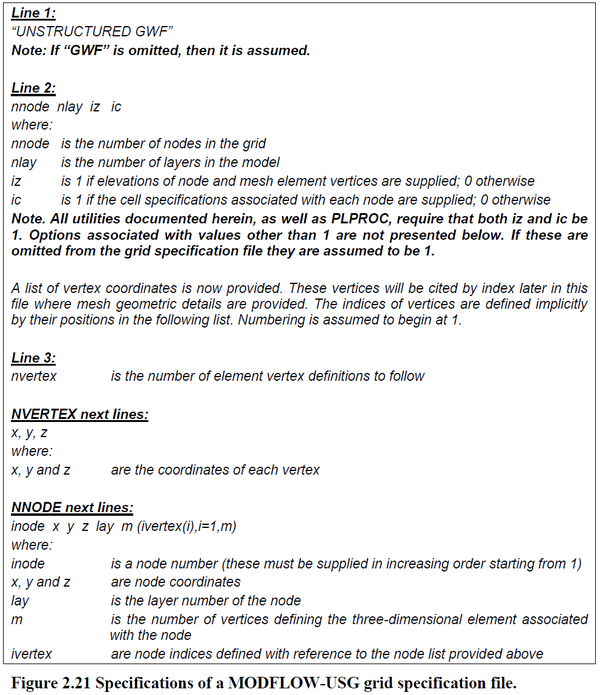GMS:GSF File Format: Difference between revisions
From XMS Wiki
Jump to navigationJump to search
No edit summary |
|||
| Line 2: | Line 2: | ||
unstructured grid. The lack of structure precludes omission of the coordinates of the vertices of each model cell. Hence the locations of these vertices must be specified in the grid specification file, together with the node that is associated with a model cell. | unstructured grid. The lack of structure precludes omission of the coordinates of the vertices of each model cell. Hence the locations of these vertices must be specified in the grid specification file, together with the node that is associated with a model cell. | ||
The format is defined ([http://www.pesthomepage.org/getfiles.php?file=gwutil_a.pdf in this link]) and repeated in the image <ref> | The format is defined ([http://www.pesthomepage.org/getfiles.php?file=gwutil_a.pdf in this link]) and repeated in the image <ref>Doherty, J. (November 2015). Groundwater Data Utilities, ''Watermark Numerical Computing'', 2(9): 26–37.</ref> below: | ||
[[Image:gsf_format.png|600px]] | [[Image:gsf_format.png|600px]] | ||
Revision as of 18:31, 9 May 2017
A Grid Specification File (*.gsf) is used with MODFLOW-USG to define the unstructured grid geometry. The grid specification file for a structured grid is far less complex than for an unstructured grid. The lack of structure precludes omission of the coordinates of the vertices of each model cell. Hence the locations of these vertices must be specified in the grid specification file, together with the node that is associated with a model cell.
The format is defined (in this link) and repeated in the image [1] below:
References
- ^ Doherty, J. (November 2015). Groundwater Data Utilities, Watermark Numerical Computing, 2(9): 26–37.
GMS – Groundwater Modeling System | ||
|---|---|---|
| Modules: | 2D Grid • 2D Mesh • 2D Scatter Point • 3D Grid • 3D Mesh • 3D Scatter Point • Boreholes • GIS • Map • Solid • TINs • UGrids | |
| Models: | FEFLOW • FEMWATER • HydroGeoSphere • MODAEM • MODFLOW • MODPATH • mod-PATH3DU • MT3DMS • MT3D-USGS • PEST • PHT3D • RT3D • SEAM3D • SEAWAT • SEEP2D • T-PROGS • ZONEBUDGET | |
| Aquaveo | ||
